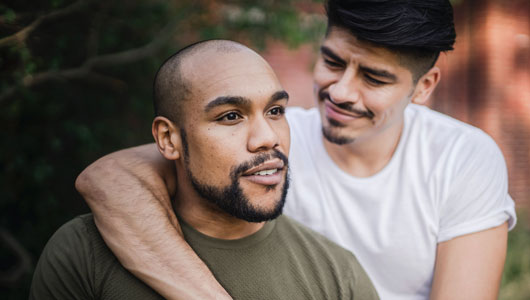
Same Sex Relationships
If you're reading this, it's because you want to know more about same-sex relationships. Well, you've come to the right place because this article explores the ins and outs of what the term same-sex means, what same-sex relationships can look like, where same-sex marriage is legal and more.
What Is A Same-Sex Relationship?
Let's start with the basics: what is a same-sex relationship? Simply put, it's a relationship between people of the same gender. However, it's important keep in mind that gender is not binary, and "same-sex" is a relatively outdated term. Because the spectrums of gender and sexuality are both are wide and varied, couples often abandon the "same-sex" terminology and opt for something more inclusive and appropriate for themselves.
Some examples of alternative terms to "same-sex" are queer, gay, or lesbian, but every couple is different and entitled to choose the term that feels right for them. For the LGBTQIA+ community, identity can be especially sacred for reasons including but not limited to historical persecution and attempted erasure of non-straight identifiers.
While the Dictionary's definition of same-sex might sound simplistic, the complexities of gender and sexuality themselves demand a deeper understanding. A common question surrounding queer relationships is: are same-sex marriages different from heterosexual marriages? So, let's unpack some of that, shall we?
How Are Same-Sex Relationships Different?
Some of the most frequently asked questions about LGBTQIA+ relationships center around the comparison to straight relationships. For example, people want to know how same-sex marriages are different from straight marriages, and whether queer dating looks the same as straight dating. To gain a clearer understanding of the answers to these questions, consider the fact that we are all the same, but different.
What I mean is that every relationship is unique and comes with its own benefits, downfalls, and timeline. The only real, discernible difference in gay relationships is that, well, they're not straight. That does not make them of lesser value, nor does it imply a separate code of ethics that applies only to non-straight people. There is no blanket description that covers every kind of relationship because, again, everyone does things differently.
Unfortunately, global society has consistently pushed the narrative that a straight, monogamous relationship is the "normal" default setting for couples, and anything deviating from that is marginalized. The truth is, however, that love is love — period. Beyond that, who you decide to love is nobody's business but yours and your lovers'.
Luckily, society has come a long way, but there's still a long way to go. In America, same-sex marriage became legal in all 50 states in 2015. That's very recent, which goes to show how much work has yet to be done for social justice and LGBTQIA+ rights. Additionally, laws do vary from country to country; as of 2021, 69 countries still have laws that criminalize same-sex relationships and/or what authorities deem to be same-sex behavior.
With this in mind, we can note a few differences between same-sex couples and straight couples. For example, straight couples have faced far less adversity as compared to same-sex couples (with the exception of straight, interracial couples, who have also been denied marriage rights as well as other human rights). Some studies also suggest that the ongoing struggle for gay marriage equality has actually contributed to higher relationship satisfaction and lower divorce rates among same-sex couples.
What Makes Same-Sex Relationships Succeed?
There's no different relationship code for same-sex couples, nor is there a guarantee that same-sex relationships will last longer or end sooner than straight relationships. Every relationship is unique, and the success of each relationship is dependent on a slew of social and interpersonal factors that varies across couples, countries, and continents.
That said, there are some thing that LGBTQIA+ partners can do to keep their relationships healthy, particularly when dealing with oppression and discrimination.
- Couple's therapy. Couple's therapy can be an awesome way to maintain the health and wellbeing of your relationship. One very important thing to note is that couples therapy is not solely beneficial to those with mental illnesses or folks struggling in their relationships. Instead, think of it as a great outlet for your thoughts and feelings.
- Individual therapy. Like with couple's counseling, individual therapy can be a wonderful way to build emotional awareness, cope with trauma, and get an unbiased, professional opinion on your relationship. Building a healthy foundation within yourself is key to a successful a relationship.
- Check-ins. Conduct regular, low-pressure check-ins with your partner on a consistent basis. This can look like a casual conversation on the couch, or a long talk over dinner — whatever feels most comfortable to you. The point here is to touch base with each other to see how things are going, and if there's anything that needs to be worked on.
- Intimacy building. Taking active steps to build emotional and physical intimacy with your partner can help your relationship stay healthy. The suggestions I've listed are great examples of intimacy building exercises, but there are many more to explore! And don't forget: physical intimacy is not always sexual. So be sure to find some non-sexual ways to enjoy a physical connection with your partner.
- Boundaries. Part of building intimacy with your partner is establishing clear boundaries, but this also applies to the people outside of your relationship. Most queer couples will experience homophobia throughout their lives, but there are ways to mitigate the effects it has on your relationship. For example, limiting interaction or cutting ties with toxic family members can be extremely difficult and painful, but can also be the healthiest thing for you and your relationship.
- Renew vows. Renewing your vows to your partner can be a beautiful and ceremonial way to remind each other and everyone around you that you're committed for life. Even if you're not married, writing and reciting promises to your partner lets them know what your intentions are for the future.
